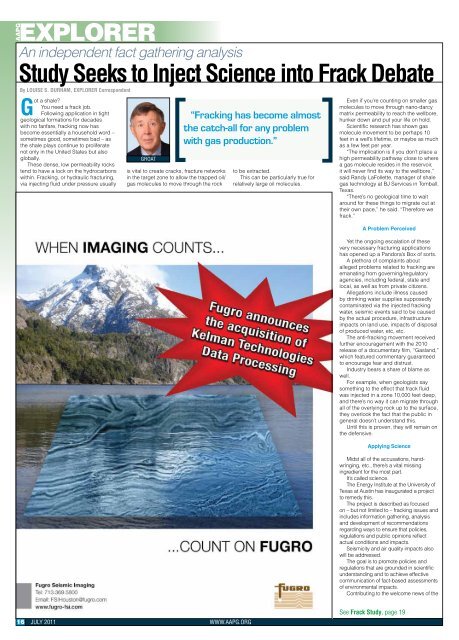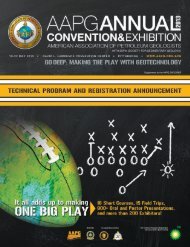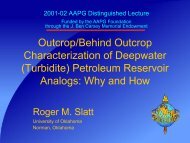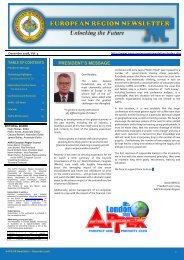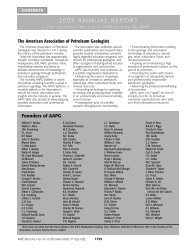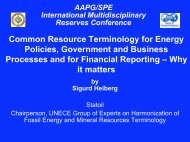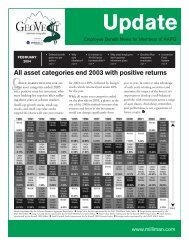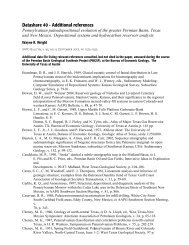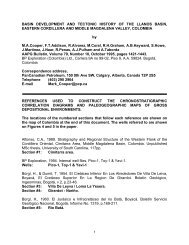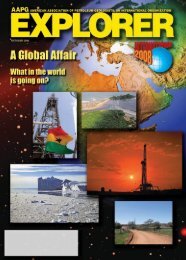AAPG Explorer - American Association of Petroleum Geologists
AAPG Explorer - American Association of Petroleum Geologists
AAPG Explorer - American Association of Petroleum Geologists
You also want an ePaper? Increase the reach of your titles
YUMPU automatically turns print PDFs into web optimized ePapers that Google loves.
<strong>AAPG</strong><br />
EXPLORER<br />
An independent fact gathering analysis<br />
Study Seeks to Inject Science into Frack Debate<br />
By LOUISE S. DURHAM, EXPLORER Correspondent<br />
Got a shale?<br />
You need a frack job.<br />
Following application in tight<br />
geological formations for decades<br />
with no fanfare, fracking now has<br />
become essentially a household word –<br />
sometimes good, sometimes bad – as<br />
the shale plays continue to proliferate<br />
not only in the United States but also<br />
globally.<br />
These dense, low permeability rocks<br />
tend to have a lock on the hydrocarbons<br />
within. Fracking, or hydraulic fracturing,<br />
via injecting fluid under pressure usually<br />
GROAT<br />
is vital to create cracks, fracture networks<br />
in the target zone to allow the trapped oil/<br />
gas molecules to move through the rock<br />
16 JULY 2011 WWW.<strong>AAPG</strong>.ORG<br />
“Fracking has become almost<br />
the catch-all for any problem<br />
with gas production.”<br />
to be extracted.<br />
This can be particularly true for<br />
relatively large oil molecules.<br />
Even if you’re counting on smaller gas<br />
molecules to move through nano-darcy<br />
matrix permeability to reach the wellbore,<br />
hunker down and put your life on hold.<br />
Scientific research has shown gas<br />
molecule movement to be perhaps 10<br />
feet in a well’s lifetime, or maybe as much<br />
as a few feet per year.<br />
“The implication is if you don’t place a<br />
high permeability pathway close to where<br />
a gas molecule resides in the reservoir,<br />
it will never find its way to the wellbore,”<br />
said Randy LaFollette, manager <strong>of</strong> shale<br />
gas technology at BJ Services in Tomball,<br />
Texas.<br />
“There’s no geological time to wait<br />
around for these things to migrate out at<br />
their own pace,” he said. “Therefore we<br />
frack.”<br />
A Problem Perceived<br />
Yet the ongoing escalation <strong>of</strong> these<br />
very necessary fracturing applications<br />
has opened up a Pandora’s Box <strong>of</strong> sorts.<br />
A plethora <strong>of</strong> complaints about<br />
alleged problems related to fracking are<br />
emanating from governing/regulatory<br />
agencies, including federal, state and<br />
local, as well as from private citizens.<br />
Allegations include illness caused<br />
by drinking water supplies supposedly<br />
contaminated via the injected fracking<br />
water, seismic events said to be caused<br />
by the actual procedure, infrastructure<br />
impacts on land use, impacts <strong>of</strong> disposal<br />
<strong>of</strong> produced water, etc, etc.<br />
The anti-fracking movement received<br />
further encouragement with the 2010<br />
release <strong>of</strong> a documentary film, “Gasland,”<br />
which featured commentary guaranteed<br />
to encourage fear and distrust.<br />
Industry bears a share <strong>of</strong> blame as<br />
well.<br />
For example, when geologists say<br />
something to the effect that frack fluid<br />
was injected in a zone 10,000 feet deep,<br />
and there’s no way it can migrate through<br />
all <strong>of</strong> the overlying rock up to the surface,<br />
they overlook the fact that the public in<br />
general doesn’t understand this.<br />
Until this is proven, they will remain on<br />
the defensive.<br />
Applying Science<br />
Midst all <strong>of</strong> the accusations, handwringing,<br />
etc., there’s a vital missing<br />
ingredient for the most part.<br />
It’s called science.<br />
The Energy Institute at the University <strong>of</strong><br />
Texas at Austin has inaugurated a project<br />
to remedy this.<br />
The project is described as focused<br />
on – but not limited to – fracking issues and<br />
includes information gathering, analysis<br />
and development <strong>of</strong> recommendations<br />
regarding ways to ensure that policies,<br />
regulations and public opinions reflect<br />
actual conditions and impacts.<br />
Seismicity and air quality impacts also<br />
will be addressed.<br />
The goal is to promote policies and<br />
regulations that are grounded in scientific<br />
understanding and to achieve effective<br />
communication <strong>of</strong> fact-based assessments<br />
<strong>of</strong> environmental impacts.<br />
Contributing to the welcome news <strong>of</strong> the<br />
See Frack Study, page 19


